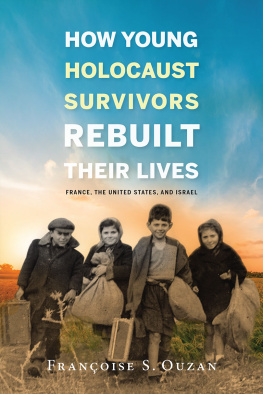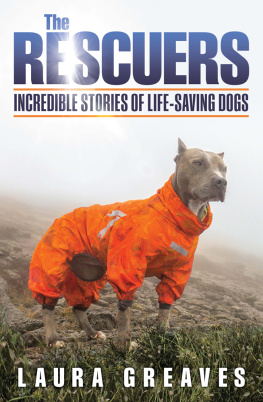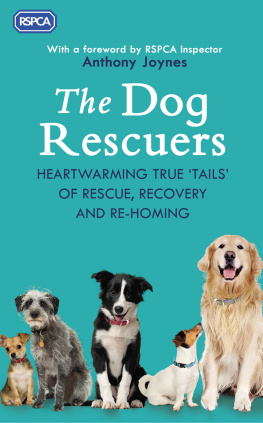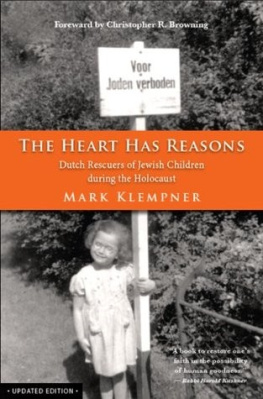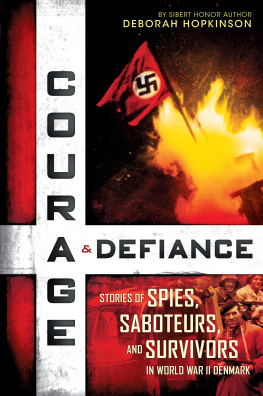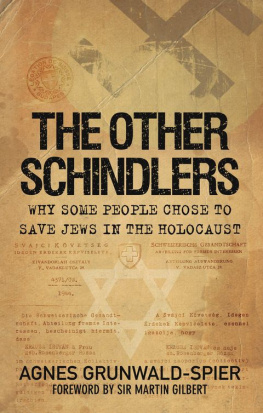Thank you for buying this ebook, published by NYU Press.
Sign up for our e-newsletters to receive information about forthcoming books, special discounts, and more!
Sign Up!
About NYU Press
A publisher of original scholarship since its founding in 1916, New York University Press Produces more than 100 new books each year, with a backlist of 3,000 titles in print. Working across the humanities and social sciences, NYU Press has award-winning lists in sociology, law, cultural and American studies, religion, American history, anthropology, politics, criminology, media and communication, literary studies, and psychology.
THE COURAGE TO CARE
THE COURAGE TO CARE
RESCUERS OF JEWS DURING THE HOLOCAUST
Carol Rittner, R.S.M. and Sondra Myers Editors
Copyright 1986 by New York University
All rights reserved
Manufactured in the United States of America
Library of Congress Cataloging-in-Publication Data
The Courage to care.
Includes indexes.
1. Righteous Gentiles in the Holocaust. 2. World War, 1939-1945JewsRescue. 3 World War, 19391945JewsRescueFranceLe Chambon-sur-Lignon. 4. Le Chambon-sur-Lignon (France)Ethnic relations. I. Rittner, Carol Ann, 1943- II. Myers, Sondra.
D810J4C68 1986 940.53503924 86-8764
ISBN 0-8147-7397-4 (alk. paper) ISBN 0-8147-7406 7 pbk.
New York University Press books are printed on acid-free paper, and their binding materials are chosen for strength and durability.
Fourth Printing, 1999
To William J. Flynn,
in Appreciation
CONTENTS
FOREWORD
ELIE WIESEL
In those times there was darkness everywhere. In heaven and on earth, all the gates of compassion seemed to have been closed. The killer killed and the Jews died and the outside world adopted an attitude either of complicity or of indifference. Only a few had the courage to care.
These few men and women were vulnerable, afraid, helplesswhat made them different from their fellow citizens? What compelled them to disregard danger and tortureeven deathand choose humanity? What moved them to put their lives in jeopardy for the sake of saving one Jewish child, one Jewish mother?
These few evoke our profound respect and wonder. They challenge us to ask ourselves questions. Above allWhy were there so few? Was it that perilous to oppose evil? Was it really impossible to help? Was it really impossible to resist organized, systematized, legalized cruelty and murder by showing concern for the victims, for one victim? Let us remember: What hurts the victim most is not the cruelty of the opppressor but the silence of the bystander.
And what of ourselves? What would we have done? Would we have had the courage to care? Who knows? We can only hope that our humanity would not have forsaken us.
In remembering the Holocaust we must not be numbed by the magnitude of its horrors. We must allow ourselves to be moved by the humanity the victims succeeded in preserving at all times. And we must humbly and gratefully look at these few individuals who, out of their religious beliefs or their humanistic education, with a simple gesture, often acting on impulse, became our protectorsbetter yet: our allies and friends. Each and every one of them is a reminder of what so many others could have done, of what so many others did not do.
Let us not forget, after all, that there is always a moment when the moral choice is made. Often because of one story or one book or one person, we are able to make a different choice, a choice for humanity, for life. And so we must know these good people who helped Jews during the Holocaust. We must learn from them, and in gratitude and hope, we must remember them.
Remember that it is easy to save human lives. One did not need to be heroic or crazy to feel pity for an abandoned child. It was enough to open a door, to throw a piece of bread, a shirt, a coin; it was enough to feel compassion... In those times, one climbed to the summit of humanity by simply remaining human.
PREFACE
CAROL RITTNER, R.S.M.
The Holocaust and human decency. Perhaps no two terms could contradict each other more. Most studies of the Holocaust emphasize the abandonment of the Jews by non-Jews who lived under Nazi domination in Europe. It is difficult to do otherwise, for the evidence of human destruction speaks for itself. We cannot minimize or ignore it. During the 41 years since the Nazi death camps were liberated, documents have been collected and books written about the killers, about the victims, about the people who stood on the sidelines and watched without raising a voice in protest as the Jews of Europe were being brutalized and murdered.
We know, however, that during the Holocaust, there were a few people, many of whom were Christians, who could not stand by and do nothing while Jewsfriends, neighbors, sometimes total strangerswere persecuted and hunted down. At great risk to themselves they took actionssometimes large, more often smallwhich saved a life. Or many lives. And for these actions they are called in Hebrew, Hasidei Umot HaOlam, the Righteous Among the Nations of the World.
In 1953, the Israeli Knesset passed the Martyrs and Heroes Remembrance Law which outlined the functions of Yad Vashem, the Martyrs and Heroes Remembrance Authority in Jerusalem, and provided a definition, albeit inexact, of the Righteous Among the Nations of the World. Those people considered worthy of the title are defined as the high-minded Gentiles who risked their lives to save Jews during the Holocaust.
Certain criteria, established by Yad Vashems Commission for the Designation of the Righteous, must be fulfilled before a person can be named as one of the Hasidei Umot HaOlam. They are: extending help in saving the life of a Jewish man, woman or child during the Nazi persecution; endangering ones own life; absence of reward, monetary or otherwise; and similar considerations, which make the rescuers deeds stand out above and beyond what can be termed ordinary help, which is of course also praiseworthy. To date, about 5,000 men and women have been identified and the accounts of their noble deeds verified. They are honored by Yad Vashem and the Jewish people worldwide as the Righteous Among the Nations of the World.
In September 1984, Elie Wiesel, noted author, teacher and Chairman of the United States Holocaust Memorial Council in Washington, D.C., convened an international conference, Faith in Humankind: Rescuers of Jews During the Holocaust. The purpose of the conference was to set forth side by side evidence of human degradation and evidence of human nobility, to illumine the deeds of the few who dared to defy evil at the risk of their own lives, and to bear witness to the world of what was done and could have been done if more people had had the courage to care.
The United States Holocaust Memorial Council wanted to focus on this small but significant chapter of the Holocaust in an effort to discover, if possible, in Elie Wiesels words, what made these few men and women different from their fellow citizens? What compelled them to disregard danger and tortureeven deathand choose humanity? What moved them to put their lives in jeopardy for the sake of saving one Jewish child, one Jewish mother?


